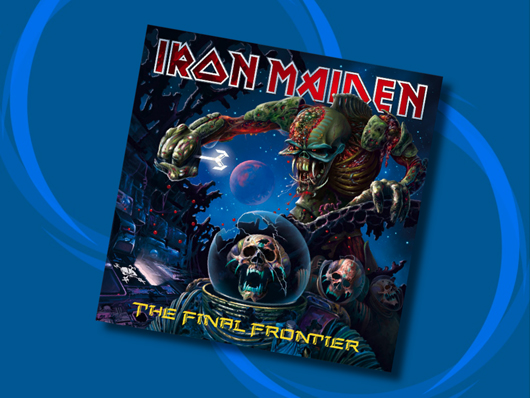
The Final Frontier review: intro
REVIEW: On Iron Maiden’s 15th studio album, The Final Frontier, the veteran heavy metal band, 35 years into their career, pull off something extraordinary that could very well be revolutionary (made all the remarkable given their age): they reinvent themselves - whether they know it or not, whether that was the plan or not - and in the process, challenge the notions of what of heavy metal, or at least their contributions to the genre, can be.
In 2010, that’s heady stuff. Who was expecting Iron Maiden, pioneers of the late ’70s/early ’80s New Wave Of British Heavy Metal, to turn the art form on its ear once again? Answer: not many, except perhaps their fans, and even they might be taken aback by the group’s splendid zenith here.
More aggressive than 2006’s A Matter Of Life And Death but every bit as experimental, the Kevin Shirley-produced The Final Frontier (recorded at Compass Point in the Bahamas, where such seminal works as Piece Of Mind and Powerslave were tracked) has been described by some as 'demanding'. This is misleading to some degree, for music, as in cinema, functions best when rules are broken, when accepted practices are abandoned. Iron Maiden have put a new fork in the well-trodden heavy metal road, and they might have altered the course of the art form for good. Perhaps the fans really weren't expecting that, but that's what they're getting.
Think about it: How many times have you watched a film or listened to a record and you knew exactly what was going to happen from one moment to the next? Way too many times, and you feel cheated and ripped-off - used. But how many times have you said to yourself, 'Now, where in the world is this going?' - and yet, you were positively riveted? Hardly ever. But on those rare occasions when that does happen, you’re going to come back, fascinated, perplexed, turned on. Art that can provoke such reactions, more often than not, can stand the test of time.
Now in their fourth decade as a band, Iron Maiden have created a work full of hypnotic excitement, unconventional structure (it’s a shape-shifter all right, from song to song and sometime during the course of individual songs) and dizzying vision. So if 'demanding' means you might not understand it (and that may have been the point here) but you’ll certainly feel it, then the group have succeeded beyond their wildest dreams.

Satellite 15… The Final Frontier
A Jackson Pollack opener, for sure. The ominous beat of Nicko McBrain’s tribal drums underpin disorienting waves of distorted guitars, some shrieking, some growling and purring. Adrian Smith, Dave Murray and Jannick Gers are revving up the engines… Drawn in yet?
A surreal first verse - comprised of echo-laden guitar and ghostly vocals - yields to a fusillade of rhythmic jabs. Then suddenly - as in, you’ll be checking to see that you haven’t advanced to the next track - the song shifts into a full-on power rocker, highlighted by two spitfire guitar solos.
Weird? Absolutely. Transfixing? Positively. It’s almost as if Maiden had two songs they decided to link. A bold move that works beautifully.
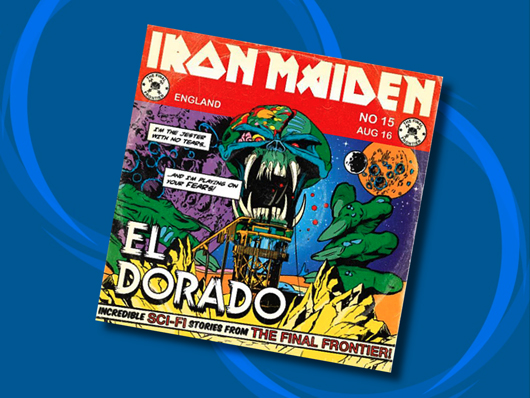
El Dorado
After a crashing, full-band intro, it’s Steve Harris’s Ponderosa-style galloping bass that informs the listener that this is indeed Maiden.
The group kicks into what is a spirited yet straightforward verse, although sinewy and dissonant guitar lines weave in and out. It isn’t until the memorable chorus that Bruce Dickinson’s voice rises above a baritone into his trademark nutsack-grabbing tenor.
A high-octane guitar solo by Dave Murray, full of smooth legato runs and let-me-get-a-real-piece-of-this-string vibrato bends, is a musical highlight.
Listen: Iron Maiden - El Dorado
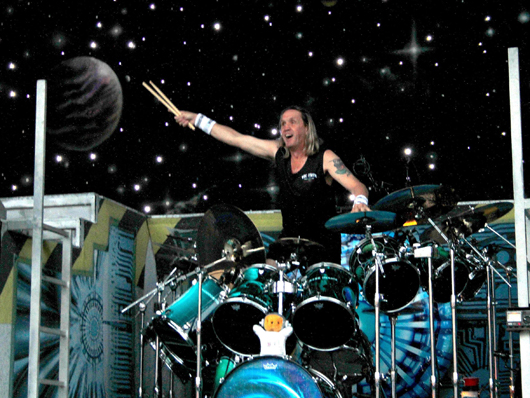
Mother Of Mercy
A lilting, quasi-baroque-meets-prog acoustic opening - think ELP’s Still…You Turn Me On and you’ll have a good idea - lulls the listener into a false sense of what is to follow.
Bruce Dickinson sings passionately and expressively about the atrocities of war over the first verse, but he lets it rip when the band knocks down the wall on the second verse. Dark and foreboding, the tune marches forth. However there’s a majesty to the sound and you’re sucked in. The rhythm is like a giant wave that grabs you and carries you away, and the further you go, the stranger - and more exciting - things become.
There are two guitar solos, but it’s the first (Dave Murray?), one which evokes the bluesy soul of David Gilmour, that really hits home.
After Dickinson bellows "Mother of mercy/Angel of death/Taking away my last breath," Nicko McBrain pulls out the stops and switches into a double-time pattern that sends the song off with considerable verve.

Coming Home
The words 'Iron Maiden' and 'ballad' have a way of sending shivers of skepticism down most spines, but on this inventive composition, the group delivers what could be a bona fide stadium anthem.
A hooky guitar arpeggio gently glides us into a dramatic, power chord-peppered verse and chorus. Dickinson’s lyrics about descending from the sky and returning home are poignant and honestly devoid of mawkish sentiment.
A snaky bit of progressive riffing is followed by a full-bodied, languid guitar solo that makes way for a second solo turn that is beyond frenzied.
Back in 1980, no one could have anticipated the leaders of the NWOBHM pulling off a ballad with such commitment and aplomb, but this winner proves that growth, 30 years later, is indeed possible.
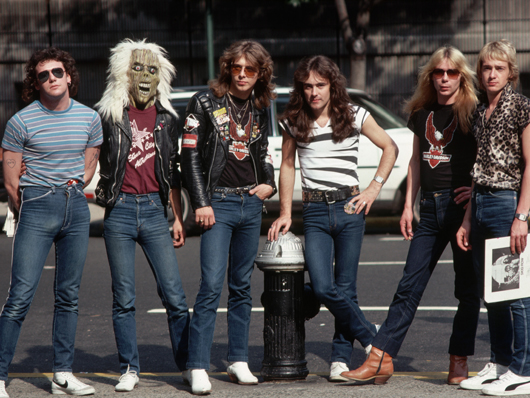
The Alchemist
You want old school? From the opening seconds, with its that-could-only-be-Dave-Murray-and-Adrian-Smith dual-harmony guitar line, this is vintage Maiden, baby.
Overall, there seems to be more bite to the rhythm guitars, and when Nicko McBrain performs a classic around-the-whole-kit drum fill you’re stunned to realize that he’s held back from doing so on the entire record… thus far.
Clocking in at 4:29, this is the shortest song on The Final Frontier, but it’s a deliciously fun ride - like looking through a yearbook while standing on the precipice of the future. Oh, and there’s an inspired dual-guitar riff pattern that precedes the final chorus - the sound and style of which is yet another smirking nod to days gone by.
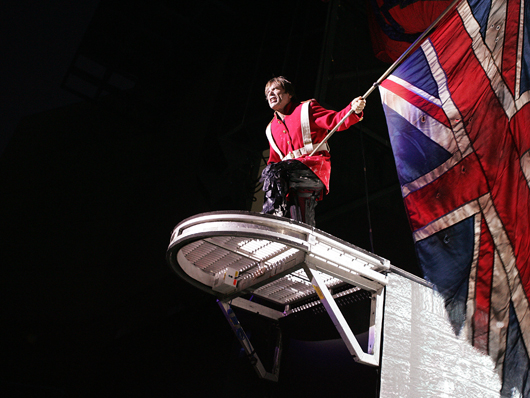
Isle Of Avalon
From here on in, the songs get longer, trippier, more zonked-out and full of surprises. In this regard, Isle Of Avalon is opulent.
A 32nd-note hi-hat pattern chatters underneath a spooky bass and effects-loaded guitar riff as Dickinson all but whispers the first verse. After an extended, unsettling interlude, the band takes off into wild zigzags of prog rock passages - it’s almost like free-form Maiden, jazz-fusion Maiden. Everybody’s going for it, and the musical telepathy that exists between the players on such unconventional time changes is astonishing.
A scorching lead guitar break is vaguely reminiscent, in tone and attack, of the extended solo section from Megadeth’s Hangar 18, but there’s sparks of invention and vitality here that ultimately distinguish it as unique.
A corker of a final chorus is broken by bursts of guitar lines, and just to hammer things home, McBrain batters the hell out of his floor toms. Stunning.
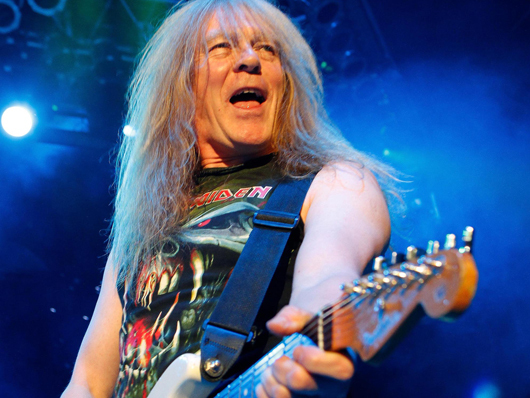
Starblind
Hard to believe, but things get even more way-out on the seventh cut, one which shows off an almost psychedelic side to a band that has, until now, resisted such influences.
Another cozy passage opens the song, but it’s fleeting - in a second we’re smashed into a volcano of metal goodness. But hold on, because this hell ride quickly shifts time signatures and melodies and, like a roller coaster, doesn’t give you a minute to think about where you’ve just been.
The guitars build in intensity throughout; the sound is slashing and brutal. After a wonderfully bluesy lead solo, the band drops out abruptly and new, single-guitar riff emerges. This leads us into a gangbang of instrumental overkill that is shattering, to say the least.

The Talisman
While you’re looking up the definition of ‘talisman’ (we’ll save you the trouble: According to Merriam-Webster, it’s 'an object held to act as a charm to avert evil and bring good fortune' - good enough topic for a song), just know that Maiden have come up with yet another head-turner of monstrous proportions.
A folk-infused intro, over which Dickinson is in Dickensonian story-telling mode (he more talks the first verse than sings it), is soon steamrollered by the band’s pulverizing force. From here on in, Dickinson shreds his vocal cords.
Arrangement-wise, this is a 'can-this-part-top-the-next?' pastiche, not unlike Rush in spots. A go-for-broke, gonzo guitar solo (Smith?) almost seems like an instrumental high point, but a second run (Murray?) is steeped in melodic blues. Somehow, the combination works splendidly.
At 9:03, there’s a wealth of ideas jammed into the song - and with any other band one might say it’s too much information - but Maiden pull it off. Fascinating.

The Man Who Would Be King
A hooky yet mysterious acoustic-and-electric guitar figure that recalls Metallica’s One opens what turns into a thunderous riff-o-rama that features a bigger-than-all-get-out chorus.
Largely in the background for much of the album, Steve Harris’ bass lines command the bulk of the first half of the song. But wait! What’s happening? Suddenly, there’s an unexpected (or should we have anticipated such by now?) shift in tempo and chord patterns and we’re plunged into a section that recalls - don’t freak - U2’s No Line On The Horizon.
Tangled bits of guitar lines tie it all together and the band whams down a crashing crescendo, but not before yet another soon-to-be classic Maiden guitar solo.
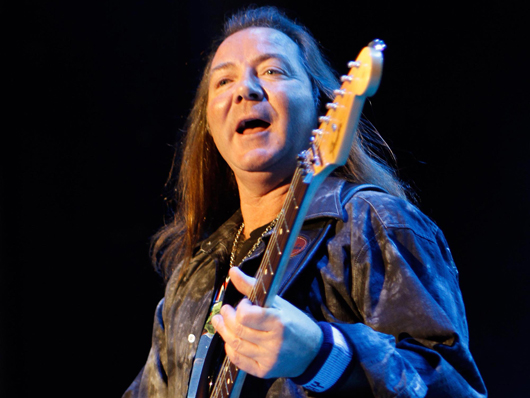
When The Wild Wind Blows
Undoubtedly, you’ve been hearing about this almost 11 minute magnum opus, one written solely by Steve Harris and based on Raymond Brigg’s 1982 graphic novel about a post-nuclear attack, but no amount of build-up can prepare you for the musical adventure that Maiden have cooked up.
The atmosphere is, at first, grim and evil, with a march-like tempo driving precise, unison playing. Lyrically we’re into some unpleasant territory, but that’s befitting the nature of the song.
Suddenly, the band breaks into a passage that is not unlike, in spirit and structure, The Beatles’ The End: every guitarist gets a chance to solo, with new tones, ideas and melodies popping up every few seconds. For lovers of six-string (or 18-string, as the case may be) goodness, this is a sumptuous feast.
The military tempo returns and the band once again segues into a multitude of soloing. It’s jaw-dropping feats of technical wizardry, but infused with passion and guts.
After a final verse, the vision ends… and a gust of wind brings us into the clearing. What a rush this has been!
Liked this? Now read: Iron Maiden's Nicko McBrain on new album The Final Frontier
Connect with MusicRadar: via Twitter, Facebook and YouTube
Get MusicRadar straight to your inbox: Sign up for the free weekly newsletter
Joe is a freelance journalist who has, over the past few decades, interviewed hundreds of guitarists for Guitar World, Guitar Player, MusicRadar and Classic Rock. He is also a former editor of Guitar World, contributing writer for Guitar Aficionado and VP of A&R for Island Records. He’s an enthusiastic guitarist, but he’s nowhere near the likes of the people he interviews. Surprisingly, his skills are more suited to the drums. If you need a drummer for your Beatles tribute band, look him up.
